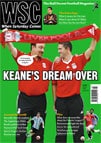 Leyton Orient's dismissal of Martin Ling met with most fans' approval yet he left with his popularity intact, says Tom Davies
Leyton Orient's dismissal of Martin Ling met with most fans' approval yet he left with his popularity intact, says Tom Davies
Supporters who clamour for their manager’s dismissal tend not to get a decent press, portrayed as they are as an impatient and fickle mob, wielding metaphorical pitchforks at the hapless gaffer at the drop of a point. Some of this is fair – sack-the-manager campaigns are often manifestations of the worst kind of phone-in led denunciation frenzies – but much of it isn’t, especially when popular sackings are accompanied not by anger but sadness.
This was the overwhelming emotion brought forth among Leyton Orient supporters after the dismissal of Martin Ling, sacked after more than five years in charge as the team he’d led steadily up the league for most of his tenure continued a freefall that had begun 12 months earlier. By the time of Ling’s sacking, the morning after a 2-1 home defeat by Bristol Rovers last month, most Orient fans wanted him out. His side, which he had surprisingly led to the top of League One in the autumn of 2007, had hit the wall horribly since. Most were, consequently, pleased to see the back of him.
Yet there had been almost no anti-Ling chanting at the ground, no hate campaigns, no fanzine or website vilification. Instead, a strange melancholy descended almost immediately, that a manager who had been solidly popular for so long had reached his sell-by date. A long, and at times cloyingly sentimental, thank you thread on the club messageboard quickly attracted hundreds of responses and reminiscences of better times – the dramatic 94th-minute winner at Oxford that conformed promotion from League Two in 2006, the Cup win at Fulham the same year, wins that were at Nottingham Forest and wins that should have been at Leeds. In each of Ling’s four full seasons at the helm, Orient finished higher than they had the previous year. Add to that his mostly admirable service to the club as a player in the late Nineties, and it’s not hard to see from where such a deep well of retrospective fondness came.
But he ran out of steam and ideas in the end, on the field and in the transfer market – as managers often do – and there was nothing knee-jerk about the steadily rising realisation among fans that it was time for a change. The football O’s regulars have been watching over the past 13 months, particularly at home, has been abysmal, the most unwatchable passing game in the division, full of sideways interplay and the odd fancy flick in the middle of the park, but no pace or penetration further forward; one-dimensional and predictable. Whoever takes over will do exceedingly well to avoid relegation.
The tributes to Ling on his departure cut quite a contrast with the reactions to other sackings at a club not known for getting rid of managers easily. When Peter Eustace was fired in 1994 an impromptu celebratory pub session was arranged within a couple of hours – even though under Eustace Orient attained their highest league finish of the past 26 years. Tommy Taylor’s ousting in 2001 sparked similarly joyful eruptions of texts and phone calls. And the 1995 dismissals of John Sitton and Chris Turner at the end of a season later made notorious by that expletive-filled Channel 4 documentary added to the tentative optimism generated by the takeover of the club by the man who sacked them, Barry Hearn.
Which brings a certain circularity to Ling’s departure, with Hearn subsequently unveiling what would appear to be an alarming exit strategy, in which his Matchroom company would buy Brisbane Road from the club and, after a five-year holiday, charge them rent, while entering talks with an apparently wealthy consortium fronted by David Beckham agent Terry Byrne about selling the club. Stadium sale profit-sharing clauses have been built into Hearn’s proposed restructuring but supporters can’t help but look anxiously at the grim precedents set by this sort of separation of ground and club ownership elsewhere, regardless of how much new investors might be able to put in.
Suddenly, Ling leading us back down into the fourth tier seems the least of our worries, though it does cement the sense of an era ending that his dismissal has signalled. Hearn inherited a loss-making relegation-bound club 14 years ago. And that is exactly what he is likely to bequeath, his most lasting legacy being a ground “modernisation” that has halved its capacity and left it impossible to expand, hemmed in by the flats that paid for new stands.
Ling will, hopefully, land another management job in league football soon. He certainly deserves to. An honest, thoughtful coach with a better eye for a player than many, he still has plenty to offer, as well as to learn. Little of this, one suspects, will be said of Hearn upon his departure.
From WSC 265 March 2009